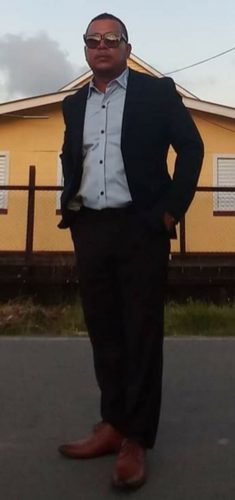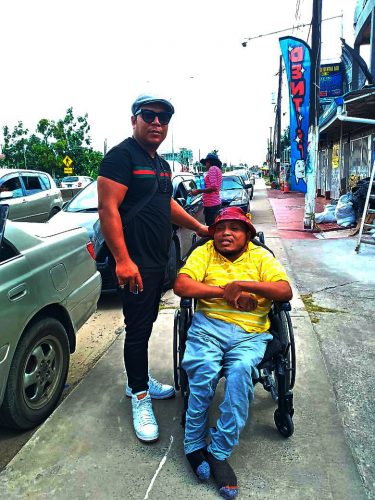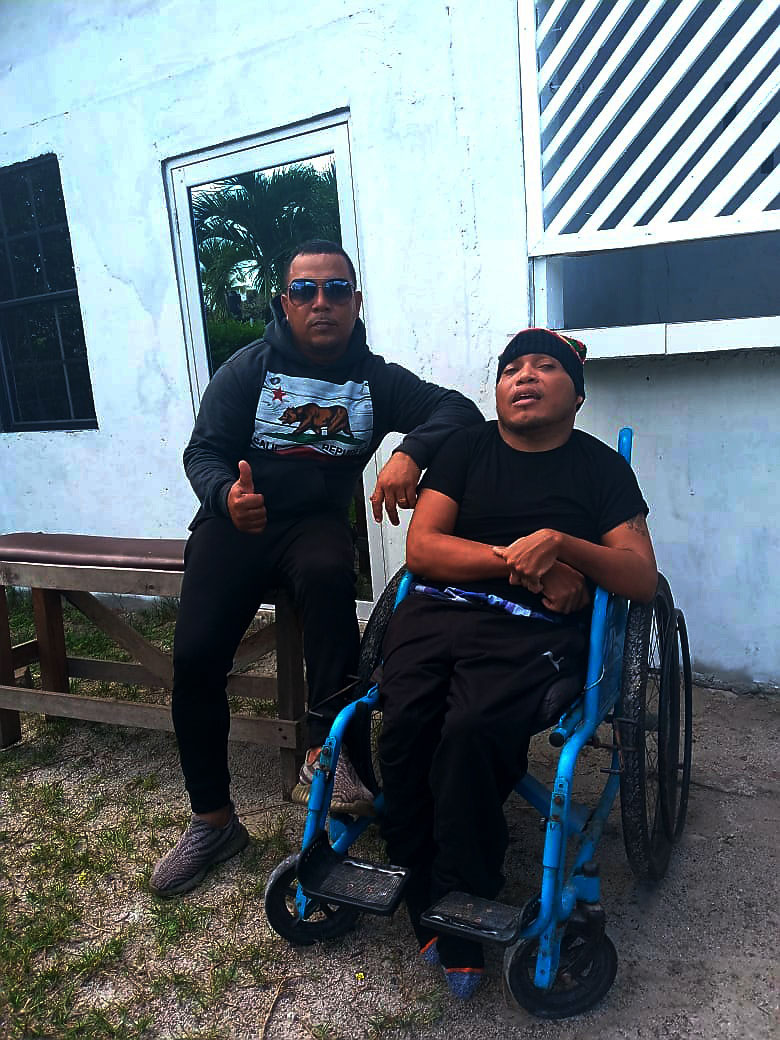Albert Burnett Jnr, 41, the seventh of nine siblings, was born two and a half years before his younger brother Jermain, 38, who is paralysed from his waist down and has limited mobility from the waist up. He has always seen himself as Jermain’s protector since their mother died when Jermain was four years old and he was six.
“As a child myself, I realised Jermain was creeping at three or four when a child that age should’ve been walking,” he recalled. At the time the family was living at Saxacalli in the Essequibo River. “Living at Saxacalli was the happiest days of my life. After we moved, it was a rough and tough journey to where we are today. That Jermain survived with God’s grace is a blessing,” Albert told Stabroek Weekend recently.
Albert made it clear from the start of the interview that he was not complaining but simply relating a life story of survival and eking out a living, even though his father was a fairly wealthy man.

His father owned several mining concessions and he recalled, “Burnett [his father] would come home every three months. He would cut the soles of these expensive Clarks shoes, put the diamonds in the soles and seal them again. When he got home he would shake them out on the bed.”
Early separation
On reflection, Albert said, when his mother died, he had an aunt at Bartica, another at Linden whose father his mother cared for when she was alive, and another in Georgetown, who could have taken care of them.
“We were eight of us in need of supervision. My eldest brother was already working with my father. Jermain was a disabled person who needed special care and attention. My aunt from Linden came and chose one of my older brothers who grew up with her and is an upstanding citizen today. Seven of us remained at Saxacalli until my father decided to bring us to Georgetown to live. My father and mom used to take care of 18 or 19 of my cousins. When my mom died no one wanted us,” he said.
After his mother died his father moved a woman in, who they called stepmother, to live with them at Saxacalli.
“When I was about seven or eight years old, she took me to Blue Mountain where my dad had a big shop and where prostitutes hung out. It was the biggest backdam in the area. We walked from about six in the morning and reached with sundown. We spent a couple of mornings there. My grandfather scolded her for taking me there and one morning he put me in a warishi and brought me out to Saxacalli. I still don’t know why she took me,” he related.
About three years after his mother’s death the family moved to Georgetown after his father and partner fought and separated.

“The night they had a big fight, we ran out of the house leaving Jermain behind with all the fighting going on. Most times when dad and his women fought, Jermain was left behind because as small children, we were only thinking of our safety. We knew they wouldn’t beat Jermain but there was always the possibility they would beat us,” he recalled.
After the move, another of the older brothers went to live with their aunt at Bartica. His eldest sister went to board and lodge with a woman on the West Bank Demerara to pursue secretarial studies. The six who remained moved to three places within a two-year span before their father mortgaged a property in Meadowbrook.
They first stayed for a few months with a cousin in Regent Street, where his father brought another woman to live with them.
“Jermain was with us at the time. I was at Redeemer Primary School, Campbellville. After a few months we went to Prashad Nagar to another aunt where my father brought another woman to live with us,” he said.
Jermain was enrolled at the Ptolemy Reid Rehabilitation Centre (PTRC) where he lived for a year. “It was rough there for him. My bigger brothers and eldest sister visited him and so we re-established contact with each other. My new stepmother didn’t want Jermain to live with us,” Albert recalled.
When that woman left, the family moved to a house in Kitty. Their father moved in a third woman, who brought her three grown sons to live with them.
“She, too, didn’t want Jermain to live with us,” he recalled. “Those were really sad times. I was still in primary school. At that time Jermain was back and forth between us and the rehab centre. We brought him home on weekends to spend time with us.”
In 1992 the family moved to Meadow-brook when the older siblings moved back in the home. “We decided to bring Jermain home full time. Things were going good but the family started breaking up again when my father married another woman. He wasn’t married to the others. That stepmother didn’t want Jermain or any of my elder siblings around either,” he said. “She had six daughters and moved them in with us. She used to beat my sisters, who were close to Jermain, so they could move out. At that time, I was going on to 11 years. My two bigger sisters were already young teenagers and were in high school. We were all neglected and we had to fend for ourselves even though we had a stepmother and my father was providing for us. My father who was always working in the interior had no time with us. We told him what was happening but it really made no sense. My stepmother scratched his head when he came home and that was it. We were deprived of many things, most of all a sound education even though my father had big businesses.
“The dynamics in the home was terrible. My stepmother paid more attention to her kids and paid no attention to our well-being. She turned her back on Jermain. My big brothers were not around and that was when the ill treatment started.”
One of his brothers and one of his stepmother’s daughters had two children together. The two of them moved out and her other daughters subsequently left.
“We were back to square one. We never took it nicely, so we too gave her back chats because she abused us physically and verbally and was always low-grading us. She cussed us out because of our Amerindian ancestry in the vilest of language. She beat me and my youngest brother a lot because when my father came home we complained to him about everything,” he recalled..
“When she finally succeeded in forcing my two teenage sisters out of the home, it was just me, Jermain and my youngest brother. I was the eldest and about 11 years going into 12 at the time. My stepmother [then] moved out with every valuable in the house. We had no more stepmothers. I believe all the women were with my father because of his money. At the time he was running an operation across the border in Venezuela. She claimed he had started a family over there. She then brought a guy to disconnect the electricity from the house leaving the three of us in the dark. When she moved out I was to write common entrance to go to high school. To get light to study I used to go in the alleyway, climb up the lantern post and hook up the wire every night.”
After the stepmother left the two bigger sisters were back and forth. “Many things happened in between including having had to literally fight to stay in the house,” Albert said.
When Jermain was no longer a full-time resident at PTRC and Albert was attending Dolphin Secondary, he accompanied him to the centre in the mornings and in the afternoons in a private bus that his father paid for on a monthly basis.
“I had to lift him in the bus and lift him out because the school had no one to lift him. I did this from when I was about 12 years old. I had been lifting him around even before,” he said.
Mechanic shop
To put food on the table as money was not always forthcoming from his father, Albert, at an early age, started to run errands and do menial tasks round a mechanic shop a block away from home.
“I had to fend for us but I was actually learning a trade or two at an early age,” he noted. His sisters who had gone to live with their boyfriends returned home to keep their company every now and again.
“When the time came for me to write the Caribbean Secondary Education Certificate examinations there was no one to pay for the subjects. None of my brothers or sisters could afford it and not even my father came forward,” he said.
After leaving school, Albert joined his father in the interior. His sister who was living in Buxton with her boyfriend took Jermain in. The youngest brother at this time had begun working with his father in the interior.
The other sister who by this time had two young children stayed at the house in Meadowbrook. While he was in the interior the house was gutted by fire.
“I was in the interior, running one of my father’s operations, when the house burnt down. Fortunately, Jermain was in Buxton. At that time Meadowbrook was still home for me. When I came to town, I helped my sister who lived there to put on a roof over the house and went back to the interior to work because Jermain was with my sister in Buxton,” he said.
Then that sister’s boyfriend died. “My sister called me to come and help to look after Jermain because she had to find a job to upkeep herself. I had to give up everything I was doing in the interior to look after him but I was not afraid of not finding work. By then I had already known my detailing work, waxing, buffing and polishing vehicles. That was the trade I learned from the workshop where I worked to help put food on the table literally from when I was a child. I learnt bodywork and spray-painting there. I used to ride and do jobs around Buxton and in neighbouring villages. I couldn’t go far. I trained myself to do anything because I never went to university. I can do surveying, dredging, run a mining operation and my detailing work. Everything I now do, I learnt on the job.”
In Buxton, Albert fell in love with a woman and got married. In the meantime, the sister who was living in Buxton moved back to Meadowbrook and so did Jermain. However, she had to work and there was no one to move Jermain around.
“I had to go there, at some point in time almost every day to move him around. It was getting too much so my wife and I decided that I should renovate the downstairs to accommodate Jermain. There were times I went to Meadowbrook to move him around and he had not eaten anything even though my sisters tried their best,” he stated.
Earlier this year with financial help from the brother who grew up initially in Linden with his aunt, Albert installed a toilet, tiled the bathroom and put in several doors and other features to make the flat habitable and more user-friendly for Jermain.
It is about three months now since Jermain has moved into the flat; Albert tends to his needs.
“Jermain is not a burden. He is just another love of my life. I have a wife who I love. I have dogs that I look after. I have a job to do and I do what I have to do. All of these are part of what makes my life worth living. Jermain gets government’s public assistance and my bigger brother, who didn’t grow up with us, gives him a monthly allowance and visits him regularly. Jermain tells him if he needs anything and he tries to get it for him. They talk almost every day. Everyone else have their own lives to live,” Albert said.
When his mother was alive, Albert said, she had met two Chinese doctors at Parika who believed they could have helped Jermain using acupuncture. She died shortly after visiting them and there was no follow up.
“My father was working and my stepmothers had no time for him. He was just growing up without the help he needed. I always told myself I would not leave him behind in whatever I have to do. I thank God I have health and strength and I could now afford to bring him to live with me. My wife supports me in what I am doing. Jermain is not a child and although he is a big man he is still like a child. He can’t fend for himself,” he said.





